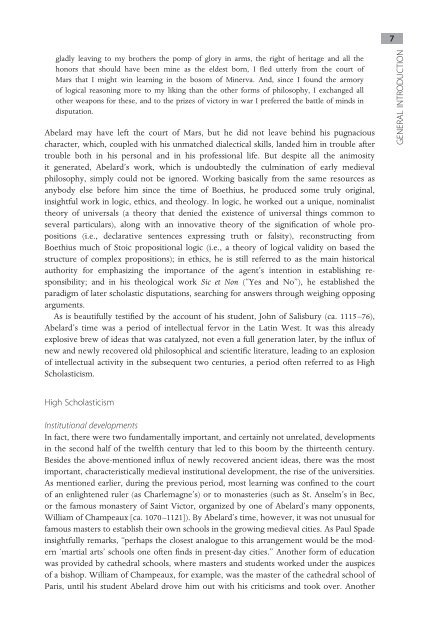Blackwell Readings in Medieval Philosophy - Fordham University ...
Blackwell Readings in Medieval Philosophy - Fordham University ...
Blackwell Readings in Medieval Philosophy - Fordham University ...
Create successful ePaper yourself
Turn your PDF publications into a flip-book with our unique Google optimized e-Paper software.
MP_A02.qxd 11/17/06 5:26 PM Page 7<br />
gladly leav<strong>in</strong>g to my brothers the pomp of glory <strong>in</strong> arms, the right of heritage and all the<br />
honors that should have been m<strong>in</strong>e as the eldest born, I fled utterly from the court of<br />
Mars that I might w<strong>in</strong> learn<strong>in</strong>g <strong>in</strong> the bosom of M<strong>in</strong>erva. And, s<strong>in</strong>ce I found the armory<br />
of logical reason<strong>in</strong>g more to my lik<strong>in</strong>g than the other forms of philosophy, I exchanged all<br />
other weapons for these, and to the prizes of victory <strong>in</strong> war I preferred the battle of m<strong>in</strong>ds <strong>in</strong><br />
disputation.<br />
Abelard may have left the court of Mars, but he did not leave beh<strong>in</strong>d his pugnacious<br />
character, which, coupled with his unmatched dialectical skills, landed him <strong>in</strong> trouble after<br />
trouble both <strong>in</strong> his personal and <strong>in</strong> his professional life. But despite all the animosity<br />
it generated, Abelard’s work, which is undoubtedly the culm<strong>in</strong>ation of early medieval<br />
philosophy, simply could not be ignored. Work<strong>in</strong>g basically from the same resources as<br />
anybody else before him s<strong>in</strong>ce the time of Boethius, he produced some truly orig<strong>in</strong>al,<br />
<strong>in</strong>sightful work <strong>in</strong> logic, ethics, and theology. In logic, he worked out a unique, nom<strong>in</strong>alist<br />
theory of universals (a theory that denied the existence of universal th<strong>in</strong>gs common to<br />
several particulars), along with an <strong>in</strong>novative theory of the signification of whole propositions<br />
(i.e., declarative sentences express<strong>in</strong>g truth or falsity), reconstruct<strong>in</strong>g from<br />
Boethius much of Stoic propositional logic (i.e., a theory of logical validity on based the<br />
structure of complex propositions); <strong>in</strong> ethics, he is still referred to as the ma<strong>in</strong> historical<br />
authority for emphasiz<strong>in</strong>g the importance of the agent’s <strong>in</strong>tention <strong>in</strong> establish<strong>in</strong>g responsibility;<br />
and <strong>in</strong> his theological work Sic et Non (“Yes and No”), he established the<br />
paradigm of later scholastic disputations, search<strong>in</strong>g for answers through weigh<strong>in</strong>g oppos<strong>in</strong>g<br />
arguments.<br />
As is beautifully testified by the account of his student, John of Salisbury (ca. 1115–76),<br />
Abelard’s time was a period of <strong>in</strong>tellectual fervor <strong>in</strong> the Lat<strong>in</strong> West. It was this already<br />
explosive brew of ideas that was catalyzed, not even a full generation later, by the <strong>in</strong>flux of<br />
new and newly recovered old philosophical and scientific literature, lead<strong>in</strong>g to an explosion<br />
of <strong>in</strong>tellectual activity <strong>in</strong> the subsequent two centuries, a period often referred to as High<br />
Scholasticism.<br />
High Scholasticism<br />
Institutional developments<br />
In fact, there were two fundamentally important, and certa<strong>in</strong>ly not unrelated, developments<br />
<strong>in</strong> the second half of the twelfth century that led to this boom by the thirteenth century.<br />
Besides the above-mentioned <strong>in</strong>flux of newly recovered ancient ideas, there was the most<br />
important, characteristically medieval <strong>in</strong>stitutional development, the rise of the universities.<br />
As mentioned earlier, dur<strong>in</strong>g the previous period, most learn<strong>in</strong>g was conf<strong>in</strong>ed to the court<br />
of an enlightened ruler (as Charlemagne’s) or to monasteries (such as St. Anselm’s <strong>in</strong> Bec,<br />
or the famous monastery of Sa<strong>in</strong>t Victor, organized by one of Abelard’s many opponents,<br />
William of Champeaux [ca. 1070–1121]). By Abelard’s time, however, it was not unusual for<br />
famous masters to establish their own schools <strong>in</strong> the grow<strong>in</strong>g medieval cities. As Paul Spade<br />
<strong>in</strong>sightfully remarks, “perhaps the closest analogue to this arrangement would be the modern<br />
‘martial arts’ schools one often f<strong>in</strong>ds <strong>in</strong> present-day cities.” Another form of education<br />
was provided by cathedral schools, where masters and students worked under the auspices<br />
of a bishop. William of Champeaux, for example, was the master of the cathedral school of<br />
Paris, until his student Abelard drove him out with his criticisms and took over. Another<br />
7<br />
GENERAL INTRODUCTION

















